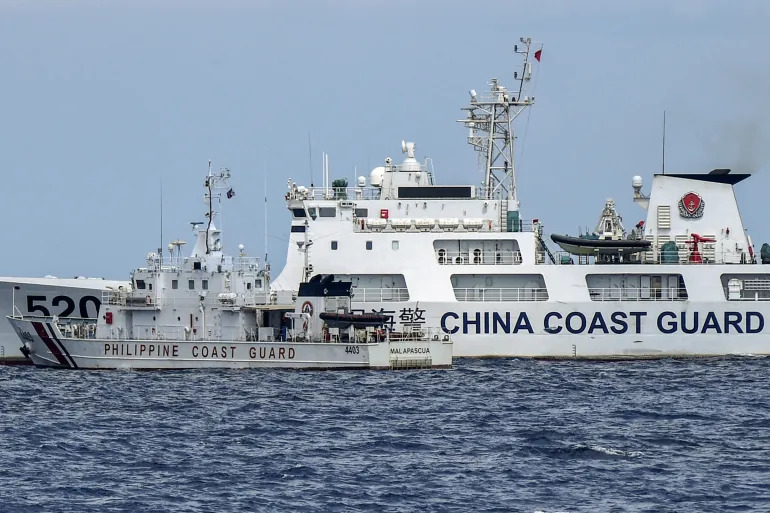The United States has accused China of “harassment and intimidation of Philippine vessels” and called on Beijing to end “provocative” action in the South China Sea after a recent near-collision between a Chinese vessel and a Philippine Coast Guard boat.
“We call upon Beijing to desist from its provocative and unsafe conduct,” US State Department spokesperson Matthew Miller said in a statement on Saturday, just two days before President Joe Biden is to host his counterpart, Philippine President Ferdinand Marcos Jr, in Washington, DC.
The State Department also warned that an attack on Philippine security forces or public vessels would trigger a US response.
“The United States stands with our Philippine allies in upholding the rules-based international maritime order and reaffirms that an armed attack in the Pacific, which includes the South China Sea, on Philippine armed forces, public vessels, or aircraft, including those of the Coast Guard, would invoke US mutual defense commitments,” Miller said in the statement.
The US was responding to a near-miss between Chinese and Philippine vessels off the Spratly Islands — the latest in a long string of maritime incidents between the two countries in the restive South China Sea.
The Philippines on Friday accused China’s coast guard of “aggressive tactics” following an incident during a Philippine Coast Guard patrol close to the Philippines-held Second Thomas Shoal in the Spratly archipelago, a flashpoint for previous altercations located 105 nautical miles (195km) off its coast.
The Second Thomas Shoal is home to a small Philippine military contingent on board a rusty World War Two-era US ship that was intentionally grounded in 1999 to reinforce the Philippines’s territorial claims in the South China Sea.
Beijing claims sovereignty over almost the entire South China Sea, ignoring an international ruling that the assertion has no legal basis.
Reporters with the AFP news agency were among staff from several media outlets that witnessed the recent incident after journalists were invited to join two Philippine Coast Guard boats on a six-day patrol of the waters, visiting a dozen islands and reefs.
The Philippine vessels approached Second Thomas Shoal, known in China as Ren’ai Jiao. As one boat, the BRP Malapascua, which was carrying Filipino journalists, neared the shoal, a Chinese Coast Guard vessel more than twice its size sailed into its path. The Malapascua’s commanding officer said the Chinese ship came within 45 metres (150ft) of his boat, and only his quick actions avoided the steel-hulled vessels crashing into each other.
The Chinese foreign ministry said on Friday that the Philippine boats had “intruded” without China’s permission and called it a “premeditated and provocative action”.
Manila responded, saying that “routine patrols in our own waters can be neither premeditated or provocative” and insisting they will continue to conduct the patrols.
Philippine President Marcos has insisted he will not let China undermine his country’s rights in the sea and has gravitated towards the US as he seeks to strengthen defence ties with Washington in the face of an increasingly aggressive China regionally.
This shift has alarmed China, which has accused Washington of trying to drive a wedge between Beijing and Manila.
‘Moral and practical support for the Philippines’
Marcos is due to arrive in the US on Sunday for a four-day visit that Philippines officials say is aimed at reaffirming the special relationship between Manila and Washington, who are longtime allies.
A senior US administration official told the Reuters news agency that it was impossible to underestimate the strategic importance of the Philippines, although the relationship was more than just about security.
Experts say Washington sees the Philippines as a potential location for rockets, missiles and artillery systems to counter a Chinese amphibious invasion of Taiwan, which China claims as its own territory.
US Defense Secretary Lloyd Austin said after the first combined meeting of top US and Philippines defence officials earlier this month that it was “too early” to discuss what assets the US would like to station at bases in the Philippines.
It is a delicate issue for Manila, not only because of its concerns about China, its main trading partner, but given domestic opposition to US military presence in the past.
The two sides did agree to complete a road map in coming months for the delivery of US defence assistance to Manila over the next five to 10 years.
Source : AlJazeera


